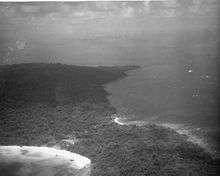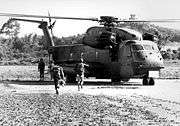Koh Tang
Koh Tang (Khmer: កោះតាង), also known as Tang Island, is the biggest of a group of Cambodian islands off the coast of Sihanoukville Province in the Gulf of Thailand. The island is situated approximately 52 km (32 mi) off the southwest coast of Cambodia. There are no permanent civilian inhabitants living on the island. The Cambodian military maintain a base with a sizable number of personnel.[1]
| Native name: កោះតាង | |
|---|---|
 Koh Tang | |
| Geography | |
| Location | Cambodia - Southeast Asia |
| Coordinates | 10°18′N 103°7′E |
| Area | 5.9 km2 (2.3 sq mi) |
| Length | 6.4 km (3.98 mi) |
| Width | 0.1–3.2 km (0.062–1.988 mi) |
| Coastline | 20 km (12 mi) |
| Administration | |
Cambodia | |
| Province | Kampot |
| Demographics | |
| Ethnic groups | Khmer |

The Khmer word Koh (កោះ), means 'island', Tang can be loosely translated to "legend".
Geography
The island is rock fringed with its highest point at its northern extremity. Two shallow coves press into the eastern and western neck of its northern plateau. The eastern cove has a long shallow coral sand beach. The small islet Koh Mul/Tuich lies about 1.3 km (1 mi) to the East and Koh Domloung (potato) island about 2.2 km (1 mi) to the South.[2] The islets Koh Tee Mui (8.4 km (5 mi) off) and Koh Tee Bpi (9.6 km (6 mi) off) complete the Koh Tang archipelago.
History
Koh Tang massacre
In May 1975, Khmer Rouge troops landed on nearby Thổ Chu Island and kidnapped 513 Vietnamese civilians (almost the entire population of Thổ Chu) to Koh Tang, where they were forced to do hard labor until they were all executed.[3]
Mayaguez Incident

The island is the site of the last combat action of the Vietnam War and the only ground combat between U.S. forces and the Khmer Rouge. On May 15, 1975, U.S. Marines on board U.S. Air Force helicopters landed on Koh Tang in the hope of freeing the crew of the SS Mayagüez which had been captured by Khmer Rouge gunboats on May 12, 1975. The crew of the Mayaguez was not on Koh Tang, but had been taken to the Cambodian mainland and were released during the rescue operation. In the course of the operation the Khmer Rouge shot down three CH-53 helicopters on or near Koh Tang and 15 Marines and Air Force crewmen were killed and another three Marines were inadvertently left behind and later executed. An estimated 13-25 Khmer Rouge were killed during the battle.
Capture of the Foxy Lady
On the evening of August 13, 1978 the Foxy Lady, a Chinese sailing junk which had been blown off course while sailing from Singapore to Bangkok, was discovered taking shelter on the western side of Koh Tang by Khmer Rouge gunboats. The gunboats fired on the Foxy Lady killing Canadian crewman Stuart Glass. The other two crewmen, Englishman John Dewhirst and New Zealander Kerry Hamill dived into the water and were picked up by the Khmer Rouge boats. Dewhirst and Hamill were later transported to S-21 prison in Phnom Penh where they were tortured and forced to write confessions. Dewhirst was executed in late August and Hamill was executed in October 1978.[4]
References
- "List of Islands". Cambodia islands – Island Species Cambodia. Retrieved December 17, 2017.
- "DECEPTION: THEORY AND PRACTICE" (PDF). NAVAL POSTGRADUATE SCHOOL. 1 June 2012. Retrieved 5 May 2016.
- "Evidence of Koh Tang massacre by Khmer Rouge". Tuoi Tre. 16 January 2014.
- Susan Pepperell (5 April 2009). "Brotherly love: Rob Hamill wants justice for brother killed by Khmer Rouge". Sunday Star Times.